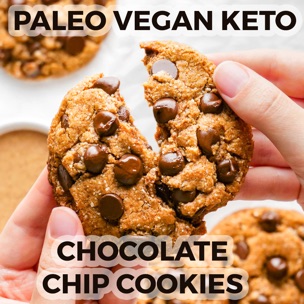Is tapioca vegan? The short answer is yes! But read on because if you’re following a vegan diet as there are things you need to know before purchasing.
What is tapioca?
Tapioca is a starch that’s extracted from the cassava root plant. It’s a pure carb with very little protein, fiber or nutrients.
So although nutritionally insignificant, it has its uses as a thickening agent or to make bubble tea pearls.
It can be sold as white flour, flakes or pearls.
I used tapioca flour in this Gluten-free Banana Bread (which has a vegan option!) and these Paleo Air Fryer Cookies, which also have a vegan option. It’s a great sub for cornstarch, but not usually a 1:1 replacement.
By the way, if you follow a gluten-free diet, you’ll also want to check out this post on Is Tapioca Gluten-free?
How is tapioca made?
Basically, it’s made by squeezing out ground cassava root’s starchy liquid.
Then the liquid is evaporated, and you’re left with a fine tapioca powder. Then it gets processed into flakes or pearls.

But is it vegan?
Tapioca in and of itself is vegan. It’s derived from a plant, and the processing methods are animal free. But if you buy pre-packaged tapioca pudding, for example, it could be made with dairy milk or eggs and is therefore not vegan.
The same goes with bubble tea. Boba balls are tapioca starch balls that are soaked in sugar and sometimes food coloring to get that dark color. Depending on the sugar used, they may not be vegan.
It’s best to buy unflavored, unsweetened tapioca balls and sweeten them yourself with maple syrup, for example. This way you know exactly what is going into your bubble tea.
If you buy tapioca that is labeled vegan to use in your baked goods and drinks, then that is your best option. The second best option is to read the ingredients and look for additives, unpronounceable flavorings or refined sugar to determine it’s not vegan. And lastly, when in doubt, contact the company and ask if their product is vegan.
Is sugar okay?
This is an important ingredient to look for when searching for vegan products along with the obvious animal products.
Some refined sugar is processed using bone char which purifies the sugar and makes it white. That bone char has its origins in slaughterhouses, so if you’re strictly against consuming processed sugar due to animal bones used in the processing, then refined white sugar should be avoided.
This is why reading the labels helps when products don’t have the official seal.
How do I know what brands are vegan?
So how can I be positive that my purchases meet all the criteria to be classified as vegan?
Firstly, review all of the ingredients on the packaging. If you have doubts, ask the manufacturer or move on to a certified vegan product with a label.
There’s also a nifty database with over 10,000 vegan-friendly products. I find it very handy and you’ll find some great products.
Vegan tapioca products
- Ener-G Tapioca Flour – this one is labeled as vegan. On their Allergen Statement, they write, “Ener-G Foods’ facilities are dedicated wheat-free, gluten-free, dairy-free, peanut free, tree-nut free, soy free, and kosher certified.” They do have some products with eggs, so be sure to check each of their products before buying.
- Let’s Do Tapioca Granules – this is labeled kosher, non-GMO, vegan and certified gluten-free. The box says the granules are great for puddings, pies and more.
- Bob’s Red Mill Small Pearl Tapioca – it doesn’t say it on the bag, but their website lists this product as vegan. Note that their tapioca starch is not labeled as vegan!
The short of it is, tapioca is naturally vegan. When looking for tapioca products, read the labels to ensure there is no sugar, additives or otherwise unpronounceable items on the ingredient lists that could come into question it being vegan. When in doubt, contact the company and ask for more information.


